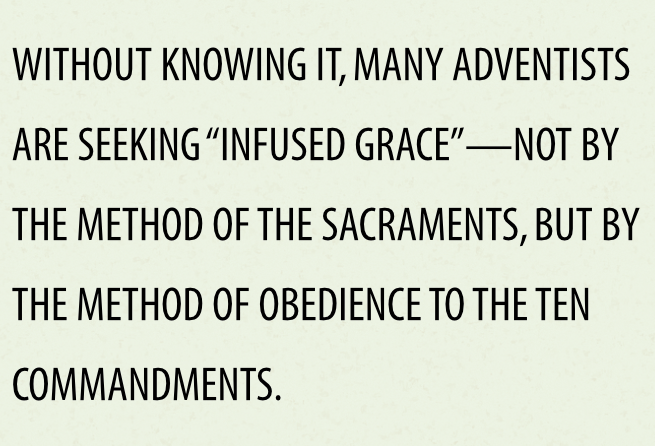ASK THE PASTOR
Recently, Carolyn and I had some Adventists stay with us for a few days. As is our custom, each night before we go to bed, we read a chapter of the Bible and pray together. We did this when our friends were with us and invited them to join us. After we read the chapter in the Bible, I invited them, if they wished, to join us in prayer. We noticed that each night they prayed, “Lord, help me overcome sin in my life.”
Now, there is nothing wrong with that prayer, but as they prayed it each night, they prayed in such a pleading way, I began to question their understanding of the gospel. After prayer near the end of their stay, I asked them, “Are you trusting the righteousness of Christ that is ‘in Christ’ or are you trusting the righteousness of Christ that is ‘in you?’” Immediately, their answer was, “We are trusting the righteousness of Christ in us. We have to be holy; we believe in obedience to the Ten Commandments.”
Some who read this may think that we are nit-picking without realizing that this issue was the central issue at the very heart of the Protestant Reformation. The Catholic Church believes in “infused grace”—the grace of God that is placed into our lives. For Catholics, the method of God infusing grace into their lives is participating in the sacraments of the church.
 Without knowing it, many Adventists are seeking “infused grace”—not by the method of the sacraments, but by the method of obedience to the Ten Commandments. The result is the same: there is no lasting assurance. One is always falling short and has to make sure there are no unconfessed sins. One never knows when he has enough of Christ’s righteousness infused into his/her life to merit a pass in the judgment.
Without knowing it, many Adventists are seeking “infused grace”—not by the method of the sacraments, but by the method of obedience to the Ten Commandments. The result is the same: there is no lasting assurance. One is always falling short and has to make sure there are no unconfessed sins. One never knows when he has enough of Christ’s righteousness infused into his/her life to merit a pass in the judgment.
This is why the Reformers, and those of us at LAM, seek the perfect righteousness of God which is “in Christ.” Once we fully understand that it is Christ’s righteousness that merits our salvation and we trust our lives totally to Him and His righteousness that comes to us on the basis of faith, then we are free to obey from the motive of love. We serve because Christ has saved us. It is His imputed righteousness that satisfies God’s justice.
There are many references we could list that support the true gospel. Here are three of primary importance.
But now apart from the Law the righteousness of God has been manifested, being witnessed by the Law and the Prophets (Rom. 3:21).
Saving righteousness is “apart from law.” Not only is saving righteousness received apart from the law, but those who are seeking saving righteousness by obedience to the law actually nullify the grace of God and the importance of Christ’s death on the cross.
I do not nullify the grace of God, for if righteousness comes through the Law, then Christ died needlessly (Gal. 2:21).
We can see the importance of precisely defining saving righteousness. A text that is one of my favorites because it makes this so clear is Philippians 3:9:
…and may be found in Him, not having a righteousness of my own derived from the Law, but that which is through faith in Christ, the righteousness which comes from God on the basis of faith (Phil. 3:9). †

- 19. The Rest that Remains - July 17, 2025
- 18. Jesus, the Law’s Fulfillment - July 10, 2025
- 17.A Better Law - July 3, 2025
